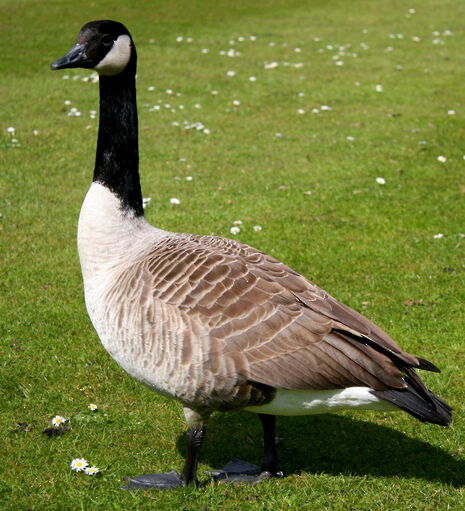King’s students protest over goose cull fears
The protest took place following fears that the college is planning to remove the geese from its grounds, which students claim would be tantamount to a cull

Students gathered outside King’s College on Saturday to protest following proposals within the college to remove their population of geese.
King’s staff have identified the geese, whose numbers have been growing rapidly over the past three years, as a health hazard, because their droppings are making footpaths slippery. Goose faeces also contain a number of harmful bacteria, and can remain on grass for weeks in summer.
But students at the college have organised in defence of the geese, insisting that “their lives have intrinsic value” after a cull of the geese was alleged to have been suggested at a board meeting. The college has publicly stated that it would “consider moving” the geese from King’s, which students opposing the idea argue would be tantamount to killing them.
Many passers-by stopped to watch the line of students outside King’s College chanting phrases like “Peace for geese” and “they don’t deserve to die”.
One protester told Varsity, “It’s a shame that the college won’t commit to non-lethal methods. What we want is to take the cull off the list of options. For one thing, it’s not a very effective strategy, as the cull won’t stop other geese from coming here. So we want college to consider other alternatives, instead of pursuing a strategy that is both inhumane and ineffective.”
According to the Facebook event for the protest, King’s College intends to capture the geese and remove them from the site. “Once captured, the geese cannot be re-released into the wild, so they will almost certainly be killed,” the organisers stated. “The college describes this as a ‘removal’ rather than a ‘cull’. They claim that what the contracted business does to the geese afterwards is not up to them. But we believe that killing geese in an attempt to reduce their numbers is a cull, whether it happens on site or off, by college employees or by an external organisation.”
In a letter sent to the College Council on 7th March, opponents of the cull from amongst the college’s students and academics argued that as “sentient beings”, the animals “deserve a life free from suffering and human exploitation.”
“Geese experience pain, enjoy the benefits of a social lifestyle, and exhibit advanced intelligence in their ability to navigate vast distances on their migratory routes,” the letter stated. “They show admirable devotion to their breeding partners and young, and strong fidelity to their home territories. Given their place alongside us as feeling creatures, we believe it is our duty to seek out ways to coexist with them in our daily lives.”
“Particularly given our place as one of the most publicly visible colleges, we hold firmly to the belief that a goose cull and animal cruelty of any kind stands in opposition to the morals we want to display and the type of community we want to call home.”
The letter suggests a number of non-lethal deterrents, including ultrasonic bird repellers, chemical deterrents, habitat alteration, and physical barriers on the waterfront.
However, some have argued that the “King’s College Members Against a Goose Cull”, as they referred to themselves in the petition, have not fully acknowledged the health risks associated with this high number of geese.
In the petition, the students state that they understand that the “natural behaviours of the geese” can undermine the “hard work” of the groundskeepers, but no mention is made of the risks of infection posed by dealing with the faeces of geese. Philip Isaac, Domus Bursar at King’s, has emphasised the health risk posed to college staff by the birds.
“It’s the lower-paid staff who are clearing it. Students aren’t clearing it,” Isaac said. “The trouble is it’s a health hazard. There are lots of diseases that can be spread through their excrement which can be quite nasty to humans.”

In a Facebook group concerning the goose cull, King’s student Anjalene Whittier posted arguing that members of the college should acknowledge the rights and welfare of the college staff in light of this health risk. She pointed out that it is low-paid college staff who are obliged to clear up the goose droppings.
“The fact of the matter is: we HAVE tried non-lethal methods of dealing with the geese, and they have not worked,” Whittier said in the Facebook post. “If we continue allowing geese to breed, we risk infecting some of the lowest-paid yet hardest-working members of staff with diseases such as cryptosporidium, giardia, coliform, campylobacter jeluni, histoplasmosis, toxoplasmosis, psittacosis, avian cholera, salmonella, e. coli, listeria, diarrhoea, nausea, vomiting, dehydration, fever, ulcers, and bird flu.”
She added: “I do find it admirable that people care so much about the geese, but I feel compelled to ask: why, then, are the fully-fledged human beings who deal with them treated as so invisible?”
Whittier also argued that the geese were having a negative impact on other species in the area. “Canada geese are an invasive species that currently pose an active threat to the River Cam, the Backs, and the internal ecosystem of the College itself. Diseases brought by the geese coupled with their hostility towards other species have meant that the numbers and health of other local wildlife have decreased while the geese have increasingly flourished.
“The only reason we cannot relocate the geese and must at this stage pursue a cull is because it is literally illegal to do so - Canada geese are legally classified as vermin by the UK government because of the danger they pose within this country.”
“In sum, I feel compelled to ask you all: As a progressive/left-wing college, as cited in the petition, why aren’t we vocally supporting workers’ rights as loudly as we’re proclaiming our support for the geese?”
A spokesperson for the University told Varsity: “The College has used a variety of non-harmful measures to deter the geese, and will continue to do so. There are no plans to cull the geese at this time.”
Opponents of the cull are planning to submit a motion to the Council again in May
 News / Night Climbers call for Cambridge to cut ties with Israel in new stunt15 April 2024
News / Night Climbers call for Cambridge to cut ties with Israel in new stunt15 April 2024 News / Cambridge University cancer hospital opposed by environmental agency12 April 2024
News / Cambridge University cancer hospital opposed by environmental agency12 April 2024 Features / Cambridge’s first Foundation Year students: where are they now?7 April 2024
Features / Cambridge’s first Foundation Year students: where are they now?7 April 2024 Comment / UK universities are sacrificing widening access for foreign fees11 April 2024
Comment / UK universities are sacrificing widening access for foreign fees11 April 2024 Film & TV / Dune: Part Two is a true epic for the ages11 April 2024
Film & TV / Dune: Part Two is a true epic for the ages11 April 2024


